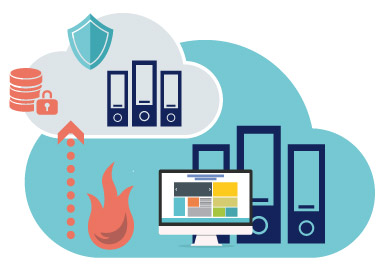Managing and maintaining complicated IT projects is a severe strain on the emerging fast-paced IT market, which is threatened by constant creativity and quicker execution.
Regardless of their size, most companies face this significant challenge and are thus unable to focus on key company goals.
Without robust cloud infrastructure, the company is vulnerable to security risks, data loss and expensive downtime. If you have a multi-tenant or hybrid cloud system, cloud-managed service providers have vast web-based expertise to help the infrastructure or address management holes.
What’s a 'Managed IT Services' Partner?
Controlled cloud infrastructure applies to day-to-day IT contracting for cloud-based applications and technological assistance to simplify and optimize the market processes.
Internal IT teams still do not have the expertise to properly track and manage a cloud system. In such cases, a organization employs a third-party cloud service provider to handle cloud services, computing, storage, network processes, application stacks, vendors and more.
Based on the IT requirements, cloud MSPs can also handle tracking and analysis, performance checking, backup and recovery, and more. With set monthly rates, recruiting a cloud managed service provider is always cheaper than an in-house staff.
10 Benefits of Cloud Managed Services Providers
As a third party service, the IT Controlled Service Provider (MSP) assumes the obligation of organizations to take up their IT burden in the form of support and maintenance. Of this cause, most organizations find Managed IT Services to be need.
Managed IT systems support businesses in many respects, and here are a few opportunities to show that MSPs can be very helpful to the company.
1. Cost savings
Monitoring and management of complex IT functions is also time-consuming. In addition, the cost of hardware, software and network infrastructure can incur more than expected costs.
In this situation, you might need to expect insiders to carry extra pressures and work beyond their key skills. With managed services, you can easily decompose ROI factors, such as the time needed for IT management, and the degree to which recruiting external help will reduce the IT pressure.
In fact, investing large sums of money on new hardware and applications at one time is an unsustainable cost. Migrating to an existing MSP means that you are applying your program to existing, professional and up-to-date IT administration.
This would obviously reduce your original expenditure and help you handle your running costs as you need to update.
2. Future-proofed technology
Managing anything could be a difficult situation for the internal IT department. That is where you will need additional professional assistance so you need to Cooperate with Managed Service Provider (MSP).The best MSP not just decreases the IT workload but also enhances the organization's IT capability through holding it up-to-date with the new technology, regular updates, protection fixes and continuous servicing by successful remote control and servicing.
Having early exposure to emerging technology puts you ahead of industry pressure and up-to-date.
3. Core Business Focus
Core market concentration is the secret to success in industry. Thanks to this cause, you can not be able to spend your time on network / system failures and correcting interrupted networks.
Have a committed Professional Service Contractor for this project, who will take away the pressure and keep you focused on the main objectives. When this occurs, you will continue using your internal IT department to work on higher-value activities.
4. Fast response times
Your company should expect fast response times by enterprise-level management and remote cloud services.
Getting a Managed IT Business Provider means that you have a specialist with you all the time, at the reach of a telephone call or an email. In fact, you appreciate stable costs that are scaled sometimes as the condition demands.

5. Predictable, recurring monthly costs
With the flexibility of cloud-based computing, you determine how much you're going to pay for IT services and provide a clear monthly bill.
For example, a tax company has a large client base during the tax season and may need more assistance during the first quarter of the year and less during the second and fourth quarters. A privatized learning system for working people would require the most help in the evenings when students are on-line after work.
With a fixed monthly payment schedule customized to suit your needs or budget, you can maximize the price you pay for IT support.
6. Reduced Employee Downtime
You never know whether any aspect, internally or externally, triggers a downtime. Some such instance will distract the attention of your employee and thus affect the overall effectiveness of your job.
Hiring a Managed IT Service Provider relieves you of this responsibility as they closely track the operations and networks. So, they know when to act, and their job is to keep the company running. So, this obviously increases the efficiency of the company and keeps the business running.
7. Enhanced Security
Safety is one of the main issues that large companies are thinking with today. No one knows when your company is targeted by a security threat or data leak. Considering this aspect, it is more important than ever to ensure that your programs and procedures conform with the corporate regulatory and enforcement requirements.
Doing it internally needs extra effort and adds to the current burden. Whereas, Managed Service Providers in operation will take care of these things by introducing more managed compliance controls, rules and procedures. At the end, this gives you enhanced protection.
8. Reduced Infrastructure Burden
Maintenance of infrastructure is a primary responsibility on MSPs in their relationship. It includes not only alleviating repairs and control, but also rising costs, natural services and manpower.
Cloud MSPs like Sereno Cloud provide a reliable 24/7 network service. Depending on the contract arrangement, a cloud controlled contract provider will track and search the network for security vulnerability specifications and more.
9. Disaster recovery

Resources are the lifeline to a cloud service provider. Sereno Cloud has built several networks and data centers with proven reliability and flexibility to ensure business continuity.
With cloud-based computing, the data will be safe and protected across all cloud infrastructure and applications. In the event of a catastrophe, your company and operations can proceed with minimal downtime.
10. Vendor interfacing
Once vendor-specific service problems occur, cloud service providers take control of approaching third-party suppliers to fix them.
As a certified Microsoft Service Provider, Sereno Cloud understands the specific issues that need to be raised while working with cloud vendors, including Microsoft and Amazon.
At Sereno Cloud, we are committed to helping companies use personalized technology technologies to reduce costs and simplify essential processes. As a cloud services provider, we set up, maintain and secure your cloud infrastructure so that you can concentrate on increasing your business.
Are you looking for trusted IT support from a cloud-first consultant? Learn more about Sereno Cloud's cloud managed services.









